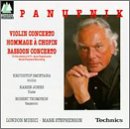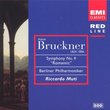| All Artists: Andrzej Panufnik, Mark Stephenson, London Musici, Karen Jones - flute, Krzysztof Smietana - violin, Robert Thompson - bassoon Title: Andrzej Panufnik: Violin Concerto / Hommage à Chopin / Bassoon Concerto Members Wishing: 0 Total Copies: 0 Label: Conifer Release Date: 10/5/1994 Genre: Classical Styles: Forms & Genres, Concertos, Historical Periods, Modern, 20th, & 21st Century, Instruments, Reeds & Winds, Strings Number of Discs: 1 SwapaCD Credits: 1 Other Editions: Andrzej Panufnik: Sinfonia Concertante for Flute, Harp & Strings / Concertino for Timpani, Percussion & Strings / Harmony UPC: 743211618823 |
Search - Andrzej Panufnik, Mark Stephenson, London Musici :: Andrzej Panufnik: Violin Concerto / Hommage à Chopin / Bassoon Concerto
 | Andrzej Panufnik, Mark Stephenson, London Musici Andrzej Panufnik: Violin Concerto / Hommage à Chopin / Bassoon Concerto Genre: Classical |
Larger Image |
CD DetailsSimilar CDs |
CD ReviewsPleasurable - rather than truly memorable Discophage | France | 09/20/2008 (4 out of 5 stars) "In the early 1990s Conifer devoted four discs to Andrzej Panufnik, culminating in the superb 9th Symphony "della Speranza" (paired with the earlier Piano Concerto) - one of the composer's last recordings, made in 1991 (Andrzej Panufnik: Symphony No. 9 / Piano Concerto). This one, with the Concertos for Violin and Bassoon and an early composition, Hommage to Chopin, was recorded in 1989 and was the first one in the series. The two others were Andrzej Panufnik: Messages - String Quartets 1 2 3 + String Sextet + Song to the virgin Mary (Conifer) and Andrzej Panufnik: Sinfonia Concertante for Flute, Harp & Strings / Concertino for Timpani, Percussion & Strings / Harmony. After it was acquired by BMG in the late 1990s, Conifer disappeared as a label I believe, and Catalyst, another BMG label, reissued some of the Conifer catalog, including the 9th Symphony and Piano Concerto (Panufnik: Symphony No. 9 (Sinfonia della Speranza); Piano Concerto, but shorn of the detailed explanations by the composer that came in the Conifer liner notes) - but I am not sure Catalyst is still operating either. Why buy these catalogs if it is to send them to the vaults of oblivion, I wonder.
Anyway, I don't find these three works as striking as the best compositions of Panufnik, the Symphonies he wrote in the 1970s onwards (starting with the 4th, "Sinfonia Concertante). Hommage à Chopin is an early work. It was written in 1949, on a commission from UNESCO to commemorate the hundredth anniversary of Chopin's death, as a cycle of wordless vocalises for Soprano and Piano; it was premiered in that form in Paris by Irène Joachim. Panufnik orchestrated it in 1966 for solo flute and small string orchestra. It sounds like the folk-inspired composition, alternately pensive and bouncy, that a young Pole under the influence of Bartok and Szymanowski at THEIR most folk-inspired would have written in those years - which is exactly what Panufnik was back then. Pleasurable, but neither original nor memorable. The Concerto for Violin and Strings was written for Menuhin in 1971. No wonder then that it should be a highly lyrical work, with a mysteriously hushed second movement, while its finale is written in a post-Shostakovich (the String Quartets come to mind) and post-Bartok (in the robust rhythms) style. Again it is a pleasurable composition, couched in an unagressive, rather traditional modernist style reminiscent at times of William Schuman or Roy Harris, and it benefits from the string orchestra's subtle and fascinating colors, but it lacks, I find, the dramatic impact of Panufnik's Symphonies. In the mid-1990s EMI-UK reissued Menuhin's premiere recording on their fine "British Composers" series (with the Concertos of Lennox Berkeley and Malcom Williamson), the instalments of which are, inexplicably, rarely listed on this website. You will find it listed on the UK sister company under ASIN B000025QYX - but the odds are it won't be available or only at cut-throat prices, as it too has been discontinued from EMI's current catalogs. I don't have it and therefore can't compare with the present recording by Krzysztof Smietana and the London Musici conducted by Mark Stephenson, but as the latter was made under the composer's supervision and with his imprimatur, I can only infer that it is authoritative. Equally authoritative is the interpretation of the Bassoon Concerto, a piece dating from 1985 and commissioned by and written for the disc's performer, Robert Thompson. Although the composer calls it an abstract work with no literary program, he does reveal that it was written with the thought heavily bearing on his mind of father Popieluszko, the catholic priest tortured and murdered by the secret police in those final years of the Communist regime in Poland, an event that shook festering Poland and incensed the free world back then. The somber timbre of the bassoon and the biting attacks of the string orchestra (reinforced by flute and two clarinets) helping, the composition bears something of that dramatic and mournful atmosphere. Again its language is gently modern, and very lyrical in the middle and extended aria. Again it is a pleasurable composition, rather than a truly memorable one. The memorable Panufnik, in my opinion, is found in Symphonies 4 to 10. TT is a none too generous 56 minutes. The liner notes, which include a short presentation of the works by the composer himself alongside essays by John Kehoe and Bernard Jacobson are highly informative. " |

